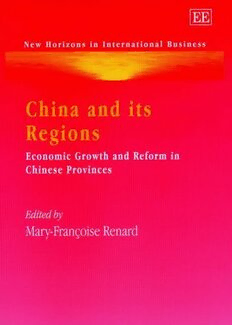
China and Its Regions: Economic Growth and Reform in Chinese Provinces (New Horizons in International Business Series) PDF
355 Pages·2002·127.721 MB·English
Most books are stored in the elastic cloud where traffic is expensive. For this reason, we have a limit on daily download.
Preview China and Its Regions: Economic Growth and Reform in Chinese Provinces (New Horizons in International Business Series)
Description:
In twenty years of reform in China, the key development has been the opening-up of the market to foreign trade and international investment. This increased economic openness has been accompanied by profound changes in both economic organization and regional disparity. This comprehensive book focuses on the link between these economic reforms and the causes - and ultimately the implications - of regional inequalities in the most populous country in the world. The authors examine the effect of globalization on regional disparities in terms of income, regional growth, industrial location, urban-rural opposition, performance of the firm, human capital and mortality. In each case they provide new insights into the main changes in the Chinese economy and give original explanations as to the sources of regional diversity. The authors find that on the whole, regional disparities in China have tended to increase since reforms were introduced. They illustrate that this rise of inequality, in terms of both growth and income, results from the aptitudes of different regions to seize the new opportunities afforded to them by market developments. They also demonstrate how current regional disparities and increased competition will go hand in hand with a polarization of industrial development in a few privileged regions. In the wake of China’s accession to the WTO, this timely book offers a unique perspective on what is surely one of the biggest economic issues the global economy will face in the coming years. China and its Regions will be essential reading for all students and scholars of business, industrial development and Asian studies.
See more
The list of books you might like
Most books are stored in the elastic cloud where traffic is expensive. For this reason, we have a limit on daily download.
